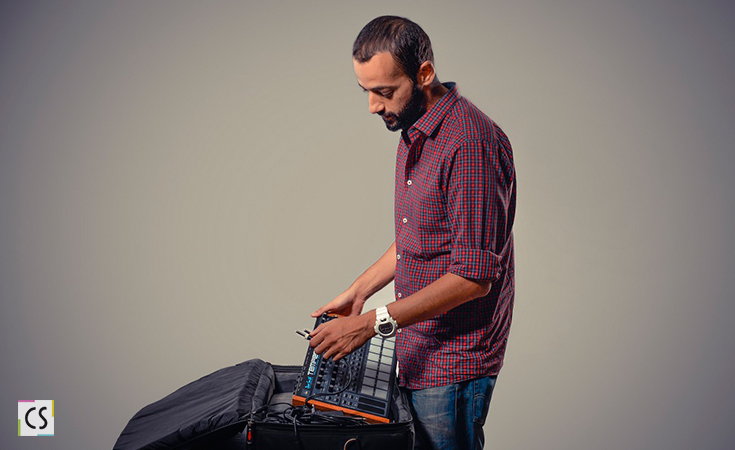Rami Abadir: On Music Criticism and Arab Authenticity
Musician, producer, sound engineer and critic, Rami Abadir meets with CairoScene's Mohab Ramadan to delve into his outspoken opinions on the local scene, unsung musical heroes and the need for constant change.

"Nobody reads the manuals for their music gear!" says Rami Abadir as we settle down for a chat with the engineer, musician and occasionally outspoken writer, as he seems to float among his own gadgets and gizmo. The 33-year old has made a name for himself as an electronic music producer, specialising, it seems, in the psychosonic world of soundscapes, ambient motion and sound sculpture. Having written about the close relation between music and technology, specifically on how technology has facilitated the diverse creative forms and the development of musical formats from vinyl to MP3 and FLAC denoting the pros and cons of each, Abadir’s approach to music journalism is as meticulous, niche detailed as his own music; deeply layered experimental Electronica that's all his own. We delve into Abadir’s brain to talk about music Goliath and how the Egyptian scene is evolving.

“There’s a guy called Haleem El Daba who is an avant-garde Egyptian musician and one of the first people to do tape-manipulation but nobody knows about him – as usual. It's like Salah Ragab, the very talented drummer who made Jazz records with masters like Sun Ra. Also, Mohamed Ragab a modern synth-head who nobody gave attention to here in Egypt; now he's friends with Trent Reznor, Richard Devine, Marc Doty and the geniuses at Moog Sound Lab." Like many millennial musicians and critics in Egypt, Abadir sees a huge gap between what makes it to the radio, TV station and press and what really needs to be put in the spotlight.
“Mainstream music appropriates subcultures to make a hit. It's most certainly not a bad thing but having this catchy tune makes your track an entertaining ‘summer hit’ but doesn't show your musical character. Does it have an outcome? Maybe, but looking at the past and future and tracking their influences and where it’s leading is a very interesting study,” says the methodical music man.
With his own music inspired by a plethora of genres and artists including, Steve Reich, Philip Glass, David Byrne, Prodigy, Trent Reznor, Nine Inch Nails and King Crimson, Abadir surprisingly has a soft spot for the homegrown Egyptian sounds known as Mahraganat. Don't get him wrong; he finds it sonically grating and lyrically vexing, but he appreciates it for its authenticity. "The synth now is the new Kanoun and it’s totally natural for these people to make this type of music, it’s a good thing they channeled their time and effort to make music out of no resources at all. These people are highly influenced by the American Hip-Hop culture. If these people made Hip-Hop instead, it’d be terrible. They reformatted it, got influenced by the Arabic/Oriental school and shaped it into something authentic.”
One the other hand, Abadir finds Arabic Rock and Pop Fusion completely unauthentic. Speaking of some of the most commercially popular bands that have emerged over the last few years, he's aghast. "Is this how we as Arabs even speak? I just don’t think it’s real; they're Arabic words, alright, but with the intonation of Western music. Some of them are very good friends of mine but that doesn't have to cloud my judgment. Fusion is a terrible thing when it comes to music. It’s mixing two things in a blender that separate right after," he continues.

“In general, Egypt’s music scene is appalling; it’s all closed social circles and failed attempts at making an actual communities. That being said, some good attempts have been of late like Epic 101 Studios and VENT," continues Abadir. "A good indication of a great music scene would be listening to someone anonymous and saying yes, I actually like that." Listing Abyusif, Tamer Abu Ghazala, Telepoetic, Object.Obscure and KIK as some of his favourite local aritsts, he's not a complete cynic, though. Suggesting that any music scene takes at least 10 years to change, Abadir pinpoints the importance of development and genre-shifting to make things interesting. "It's all about the journey, any creative individual would not confine themselves to one field only," he explains. In order to speed up this process, he believes we should start striking out words like 'underground/independent/alternative' from our dictionaries as it doesn't let listeners focus on the music itself.
He also believes the Muzix Expo is an important step in the right direction, giving musicians a platform to share their experiences and create a community, while he champions the ides of creating new and more varied venues to complete the cycle. After all, musicians make music for themselves and the crowd. "It's like finishing a painting, it's for you first and when you see it in an exhibition, it's even more thrilling," he concludes.
You can listen to Rami Abadir's music on Soundcloud.com/Rami-Abadir.
Photography on location at MO4 Productions Studios by Ahmed Najeeb.
- Previous Article Cairo Tattoo Convention Announce Launch Party!
- Next Article When the Sun Shines on Ramses: Egypt’s National Campaign to Restore Abu Simbel
























